
Guests
- Oleksandra Matviichukhuman rights lawyer and civil society leader based in Kyiv.
- Tymofiy Mylovanovpresident of the Kyiv School of Economics, associate professor at the University of Pittsburgh and former trade minister of Ukraine.
As the United Nations reports more than a million refugees have now fled the violence in Ukraine, the U.N. General Assembly voted 141 to 5 to denounce the Russian invasion. Meanwhile, Russian troops have reportedly seized their first city: the strategically located southern port of Kherson. Heavy shelling continues to be reported in the cities of Kharkiv, Chernihiv and Mariupol, and a 40-mile-long Russian convoy approaching Kyiv has been stalled due in part to Ukrainian resistance. We go to Kyiv to speak with Tymofiy Mylovanov, president of the Kyiv School of Economics and former Ukrainian trade minister, who details the global financial costs of the war and describes how the Ukrainian government is mobilizing to fight the resistance. We also speak with Kyiv-based human rights lawyer Oleksandra Matviichuk, who calls on the international community to impose more sanctions on Russia.
Transcript
AMY GOODMAN: Russia’s invasion of Ukraine has entered its second week, with Russian troops seizing its first city, the strategically located southern port of Kherson. Heavy shelling has also been reported in the cities of Kharkiv, Chernihiv and Mariupol. Meanwhile, a large Russian military convoy heading to the city of Kyiv is stalled, due in part to fierce resistance by the Ukrainians. Delegations from Kyiv and Moscow are holding a second round of talks at the Ukraine-Belarus border today. On Wednesday, the Russian military acknowledged for the first time around 500 Russian soldiers have died since the invasion began, but Ukrainian officials say the number is much higher, like 7,000 Russian soldiers dead. The United Nations now says more than a million refugees have fled the violence in Ukraine. The U.N. High Commissioner for Refugees Filippo Grandi spoke earlier today from Bucharest, Romania.
FILIPPO GRANDI: In just seven days, 1 million people have fled Ukraine, uprooted by this senseless war. I have worked in refugee emergencies for almost 40 years, and rarely have I seen an exodus as rapid as this one. Hour by hour, minute by minute, more people are fleeing the terrifying reality of violence. … International solidarity has been heartwarming, but nothing — nothing — can replace the need for the guns to be silenced, for dialogue and diplomacy to succeed. Peace is the only way to halt this tragedy.
AMY GOODMAN: We begin today’s show in Ukraine, where we’re joined by two guests. Tymofiy Mylovanov is president of the Kyiv School of Economics, an associate professor at University of Pittsburgh and former minister of economic development, trade and agriculture of Ukraine under President Zelensky. And Oleksandra Matviichuk is a Kyiv-based human rights lawyer and civil society leader.
Oleksandra, let’s begin with you. Can you describe the scene on the ground in the capital of Ukraine, where you live and work, in Kyiv?
OLEKSANDRA MATVIICHUK: Maybe I will quote my colleague, who wrote in her Facebook very emotional words which express my own feelings. She wrote that there is things which are difficult to do now. It’s become very difficult to eat, to sleep, to go asleep, as such, and to rest. It’s very difficult not to worry every time about our beloved ones, where they are and how — are they alive and safe. It’s very difficult not to go to cry when you see the streets of our beloved Kyiv, which are ruined because of casualties. But there are things which are very easy these days, to imagine how one famous building are burned on the one famous square and do our best in order to have it burned. For sure, it’s metaphor. We defend Ukraine. We’ll not invade on Russia. But this is like a spirit of Ukrainians who resist with Russian aggression.
NERMEEN SHAIKH: Oleksandra, you tweeted earlier today about your father being in a territory occupied by the Russians. Could you explain where he is and what you know of his situation?
OLEKSANDRA MATVIICHUK: We restore Euromaidan SOS, and now we work on several directions. That’s why I will not tell where my father, his territory is located, because it could not be safe for him. My father is a doctor. He now in territory which under temporary Russian control. It’s a territory with different small villages, and they destroyed them. And these villages, I saw pictures of how this totally destroyed. And this is a territory where Russians don’t allow to provide humanitarian assistance. And I lost the connection with my father for several days.
NERMEEN SHAIKH: And, Oleksandra, you know that later today Russians and Ukrainians are expected to begin the second round of negotiations. What do you expect will come out of those talks?
OLEKSANDRA MATVIICHUK: Nothing. I expect nothing, because also today Vladimir Putin spoke with President Macron, and he told him, according the Kremlin’s release, that all military goals in Ukraine will be definitely completed. So, for Putin, it’s not enough price to stop. And this is the responsibility of the West and international community to increase this price to the top.
NERMEEN SHAIKH: Well, I mean, there are already extremely wide-ranging sanctions in place against Putin, those closest to him, various oligarchs, banks. What more do you think that NATO, the West should be doing?
OLEKSANDRA MATVIICHUK: I know how it’s here, because when you hear the news, you can have a, like, impression that everything was used. But it’s not true. When we speak about SWIFT and ban Russia from SWIFT, only seven banks — only seven Russian banks are banned from the SWIFT. And this ban will introduce into force only in 12th of May — of March. We have to survive to this 12th of March. And why only seven Russian banks? Why not all Russian banks are banned from SWIFT? Why only Russian banks? Because Belarus also fighting against Ukraine. We need immediate ban of SWIFT all Russians and all Belarusian banks. And if you took any such kind of sanctions, you will find a lot of gaps in the sanctions.
AMY GOODMAN: I want to bring Tymofiy Mylovanov into the conversation, president of the Kyiv School of Economics, associate professor at the University of Pittsburgh, Pitt. And you were a former government official. Can you describe, in your area of Kyiv, what you’re seeing right now? And you are very familiar with American audiences, a professor at Pitt. Talk about what you feel needs to happen right now and what the U.S. response has been.
TYMOFIY MYLOVANOV: Thank you. Thank you for having me.
I was in Kyiv during the first day. And at the Kyiv School of Economics, we have security protocols. We were lucky to have been able to trigger them quickly enough, within 30 minutes of attack. So most of our faculty, staff and students evacuated, but not all. We have lost contact with some of them, with some students in particular. We’re checking up on everyone individually and trying to get people to safety or supply those who have decided to resist and fight. And then, yet others are — essentially, Kyiv School of Economics is operational now, and all our analytical resources are pushed towards or allocated towards what the government ask us to do.
And I had, myself, to get out of Kyiv, but I had a Plan B somewhere in the suburbs. But, unfortunately, Plan B was really, really bad, because the suburbs were the first area where the paratroopers landed and where there were first firefights on that very same day. So, you know, I was driving out of Kyiv, and there were columns of tanks moving against, kind of, us and engaging around the airport. So we had to move multiple times. But I really, you know — and we keep moving. So, in the area where I am now, we are sufficiently — sufficiently far away from the military activities. But even here there are their reconnaissance or their intelligence groups which are collecting information, in particular on people, like, you know, who engaged in active resistance, even far from the actual military action. So, we have to keep moving, in fact, unfortunately.
The situation here is the economy is functioning. We see a lot of refugees. It’s really heartbreaking, and it’s very, very emotional. This shouldn’t be happening in the 21st century to anyone. At the same time, I see buses of — so, there is full mobilization in Ukraine, you know. So, at every town, every city, you see buses being shipped to the front, buses of males. And, you know, it feels like everyone is being drafted. So, we probably will put millions of people to the military right now. At least that’s the feeling. You know, it’s like — imagine you’re in New York, and it’s at kind of rush hour, and you’re at the central station, and the trains coming and leaving and coming and leaving. That’s the feeling you get by next to the military drafting headquarters. But people are just coming, and buses are just leaving. And officers are just yelling, “Who is ready to go?” you know, “Board,” and “Who is at 4 p.m.?” and “Who is at 6 p.m.?” and “We need more buses. We need more trucks. We need this, and we need this.” And there are people everywhere, you know, lines, 12-hour-long lines to get drafted. So, it’s insane, really.
NERMEEN SHAIKH: And, Tymofiy, you said on February 18th — that is, before the Russian invasion — that the crisis had already cost Ukraine several billion dollars. Could you explain how that was and what you think the costs, the economic costs, quite apart from the human and humanitarian costs — what the economic costs to Ukraine will be of a protracted conflict, if that’s what happens?
TYMOFIY MYLOVANOV: Absolutely. So, there are three types of costs. One is lost GDP, lost economy, you know, because the economy is being disrupted, and the global economy will be disrupted, too. People, I think, fail to realize it. We’ll talk about it in a second. The second cost is the cost of ongoing operations right now, you know, military operations, humanitarian operations. And the third cost will be the recovery afterwards, or what wouldn’t be able, won’t be possible to recover.
So, we made estimates before the war in the scenarios without war, just economic blockade of the ports of Odessa and Mariupol, when Ukraine wouldn’t be able to ship for a while grains, for example, and other agricultural products. And we also made an estimate of the opportunity costs, lack of investment or slowing down business development projects. That was used, actually — those estimates were not simply expert opinions. Those estimates were done using general equilibrium models for international trade — what would happen if there are disruptions, what would be — how the countries will be affected around the world, where they will look for other suppliers, and so on. So, at that point, we estimated that Ukraine would be losing between half and 3% of GDP per four weeks of conflict, of blockade. Now, of course, this is much higher, so we’re probably losing about 5% of GDP per three, four weeks. And to put it in some numbers, this is going to be $6 billion to $10 billion, I think, a month, and this is simply opportunity cost of the economy, plus I don’t know how much the war is costing.
But I think the bigger picture for the entire audience would be that Ukraine and Russia together constitute about 30% of global wheat supplies, and those are usually shipped through Black Sea. Nothing is being shipped right now through the Black Sea. On top of that, right now is the season when you need to plant the seed, you know, plant the wheat and the other grains for the — you know, if you want to get harvest sometime in the fall. And this is disrupted, in both countries. So we’re actually looking at a really low supply, a significant reduction of supply in grains in this year in the world, across the globe. And that’s going to push the prices and disrupt food security, specifically in the Middle East and some of Asian countries. And it’s going to ripple through the entire economy.
AMY GOODMAN: Tymofiy Mylovanov, if you can also talk about the significance of the city that was taken, Kherson? We’re talking about the Black Sea area now. We’re talking about artillery falling on Mariupol, Chernihiv, and also the heavy shelling of Kharkiv, the second city of Ukraine, not to mention in Kyiv, if you are hearing the bombardment that’s going on now. And the nonviolent resistance, like Zaporizhzhia, the nuclear power plant, the largest complex in Ukraine, the fact that hundreds of people have lined up to try to stop the occupation of that plant. Meanwhile, Russia has reported to the IAEA, the International Atomic Energy Agency, that they are running the plant now.
TYMOFIY MYLOVANOV: Yes, it is true that there are reports that Russia troops moved towards to “secure,” quote-unquote, nuclear facilities. But now we have heard of reports of Chernobyl, which is not operational. It’s just the site of the nuclear disaster. And then you have the largest station in Europe, Zaporizhzhia. Overall, there are 15 reactors in Ukraine, and they operate in multiple, in very different cities.
There is a real kind of problematic evidence about Chernobyl. There are sensors which are monitored internationally. And a couple of days ago, they spiked up about a thousand times and then returned to normal. Faculty at MIT, people who work on nuclear security and nonproliferation, have written a report, and it has been sent to me privately, because the Kyiv School of Economics is involved in providing analytics to the government. And in this report, it says that the only possible explanation to this specific pattern of radiation increase and then reduction and the return to normal is that the facilities where the storage of the nuclear waste and the areas where there was the Chernobyl explosion and there was coverage over it have been quickly opened and closed. And the only rationale or the running rationale why it was done, to open and close, in order to maybe mine it or secure it in some other ways. So, we see that there are other symptoms. The Russians are securing nuclear stations, and, as in Chernobyl, we see that there are leakages of radiation, so that they’re not just securing; they are doing something there. What exactly they are doing, you know, people fear that they’re mining, essentially, them and putting explosives there or in some areas. That’s what analysts from the MIT are suggesting. I hope it’s not true. But, you know, every time I made an assumption what should be true and what should be rational for Putin to do, I was wrong. So, you know, it’s really scary.
Now, Mariupol is being, yeah, shelled. Kharkiv is being shelled. Kyiv is being shelled. Kherson is contested. Yesterday I wrote a tweet; I tweeted that it, de facto, has fallen. Apparently it’s not. It’s being contested even today. So, you know, it’s really — there are also reports of some counterattacks from Ukrainian forces at least in three towns. And my friends confirmed in one of them that the Ukrainians have been able to take it back, a village in a suburb of Kyiv. So, it’s a very fluid situation with a lot of civilians dead and millions now of displaced people — millions, maybe even tens of millions, domestically. And it’s going to go for a while. It’s a massive conflict, and just not everyone realizes how big it is.
NERMEEN SHAIKH: Oleksandra, we’ll end with you. Could you say what you think would be required for a ceasefire and what you believe Putin’s objective is?
OLEKSANDRA MATVIICHUK: I think that it’s very important to put attention to the war crimes which committed Russia during these seven days, because we provide documentation of these war crimes, and so that intense of this war crimes is become more and more from days to days. Russia deliberately targeted civilian objects, and this is objects which are far from any military complex or army. And this mean that it’s a policy, how to provide harm to civilians and provoke panics. We collected data how Russians liquidated hospitals, children garden, schools and other civilians objects with a high level of security, according to international humanitarian law. And this has to be stopped, because Russia used war crimes like a technology of conducting war. And we are very grateful that International Criminal Court started the full investigation, but it’s very — but international justice postponed in time. We need to do something now in order to save people’s life. And what we need from the West, we need no-fly zone. We need protect — protection our sky, because all this rockets, which now shelling the Kharkiv, Chernihiv, Mariupol and other cities, destroyed civilian objects.
AMY GOODMAN: Oleksandra, as we wrap up, how do you live with the fear — you, your family, your friends?
OLEKSANDRA MATVIICHUK: When the war started, I asked myself, “Do I feel a fear?” And I was emotional, but I don’t have fear. I have two main emotions. The first emotion is anger. I really anger, as the millions of Ukrainians, that Russia invades to our country, that Russia try to stop our democratic choice, that Russia try impose the logic of Soviet Union and push us away to the past, which we don’t want to return to. But most big emotion is love. This is a love to my country. This is a love to our people. It’s love to our values. And we will stand for it.
AMY GOODMAN: Oleksandra Matviichuk, human rights lawyer in Kyiv, and Tymofiy Mylovanov, the president of the Kyiv School of Economics, professor at University of Pittsburgh and former minister of economic development, trade and agriculture of Ukraine, also joining us from the suburbs of Kyiv.
Next up, we’ll speak with Matt Duss, Bernie Sanders’ foreign policy adviser and a Ukrainian American. Plus, we look at how Russia’s war in Ukraine could spark a nuclear catastrophe. Oleksandra and Tym, please be safe. Stay with us.


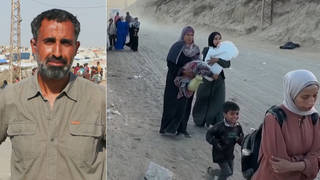

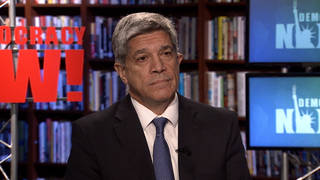

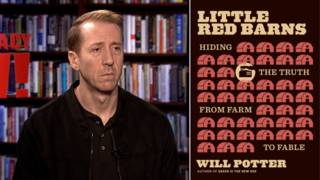

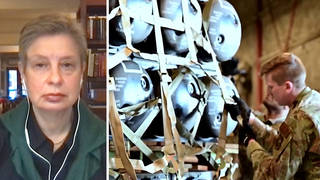
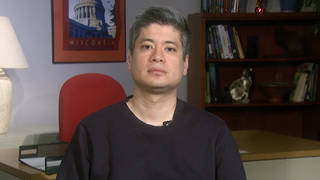
Media Options